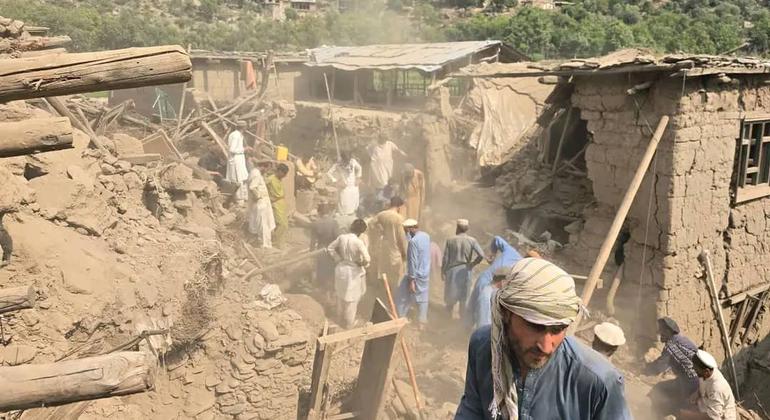Sure! Here’s the translation to American English:
—
A humanitarian assistance mission is rapidly deploying in Afghanistan following the devastating earthquake that struck the northeast of the country. Aid teams are facing numerous challenges, such as blocked roads and downed communication lines, while the need for urgent assistance in remote communities is becoming increasingly evident.
UN assessment teams have made a significant effort to reach the mountainous district of Ghazi Abad, where the urgency to ramp up the humanitarian response has been revealed. Salam Al-Jabani from the United Nations Children’s Fund (UNICEF) emphasized that “rescuing people from the rubble is an immediate priority,” adding that the population is urgently requesting help to bury the deceased and rescue those trapped.
According to preliminary data from Afghan authorities, at least 1,400 people have lost their lives, and more than 3,100 have been injured as a result of the 6.0 magnitude earthquake. The numbers could rise as search and rescue teams gain access to more affected areas, although many communities remain inaccessible.
Access conditions are severe, with landslides and rocks left in the wake of the earthquake and recent heavy rains. Al-Jabani reported that teams had to abandon their vehicles and walk for two hours to reach Ghazi Abad, and that some villages require up to six or seven hours on foot to be reached, with no possibility of air access.
The state of communications is equally challenging; there is only one operational cell tower near a health center, while the rest of the region is cut off, further exacerbating the crisis.
In response to the emergency, the UN has deployed at least 25 assessment teams to the affected region and has increased humanitarian support flights from Kabul. Additionally, the UN Refugee Agency (UNHCR) is distributing essential items from the capital, such as temporary shelters, blankets, and solar lamps.
The immediate needs of the population are alarming, highlighting the urgent demand for shelter, medical supplies, drinking water, and food assistance. However, transporting medications has become a major challenge, as only essential products are being moved on foot from the nearest hospital supported by UNICEF.
Medical care in the region is precarious; in a damaged health center in Ghazi Abad, staff are treating the injured outdoors, under trees, due to fears of staying inside the cracked building.
Despite the adversities, thousands of members of local communities are mobilizing to the area to assist with rescue efforts, bringing water and food to help those in need. “Thousands of people are constantly coming in and out of the area,” said a UNICEF official, reflecting the solidarity and determination of the local population amid this humanitarian crisis.
—
If you need any further adjustments or assistance, feel free to ask!
Referrer: MiMub in Spanish











